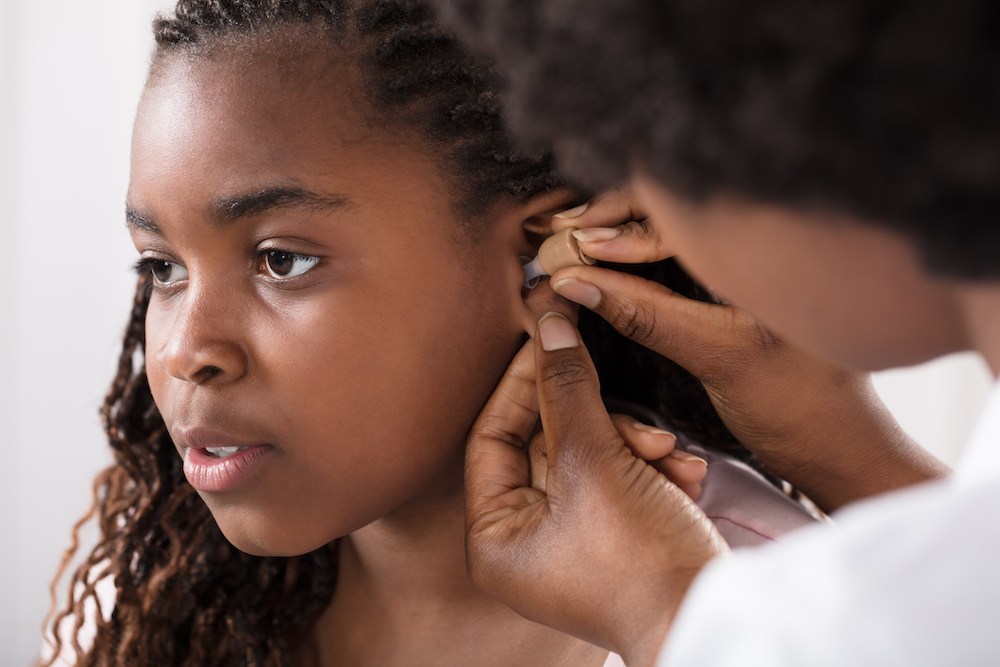Should I Be Worried About Mild Ear Discomfort?
Mild ear discomfort is something most people experience at some point,

By: admin | May 23, 2025
When hearing becomes difficult, it affects more than just conversations. It can change how you interact with family, perform at work and even how safe you feel in everyday situations. That’s why having the right hearing care professional by your side makes all the difference. These specialists don’t just test your hearing – they become partners in improving your quality of life.
Your hearing care professional stays with you throughout your entire hearing health journey. From the first hearing test to helping you choose the right hearing aids and making adjustments as needed, they provide personalized care based on your specific needs and lifestyle. We understand that each person’s hearing challenges are unique, which is why professional guidance is so valuable. Having an expert who knows both the technology and your individual situation leads to better outcomes and helps you regain confidence in social settings, at work and in your daily activities.
Hearing specialists provide a wide range of services designed to support your hearing health at every stage – from identifying hearing loss to offering long-term care solutions. The process typically begins with a thorough hearing evaluation. These tests go beyond simply detecting whether you can hear a tone; they assess how well you understand speech, how your ears respond to different frequencies and whether both ears are working together effectively. This comprehensive testing helps pinpoint the type and degree of hearing loss you may have, which forms the foundation for any hearing loss treatment plan moving forward.
Once hearing loss is identified, your specialist will guide you through treatment options tailored to your specific needs. For many people, this includes help selecting and fitting hearing aids. Your provider will recommend models that match your lifestyle, comfort preferences and budget, and will program them to suit your unique hearing profile. They also offer ongoing services like device maintenance, repairs and adjustments to keep your hearing aids performing their best. These routine follow-ups ensure that any changes in your hearing or preferences are addressed, helping you get the most benefit from your devices. Whether you’re brand new to hearing care or continuing treatment, your specialist is there to support your hearing needs over time.
Recognizing signs of hearing loss in yourself can sometimes be tricky, as the changes are often gradual. In the early stages, you might notice difficulty understanding conversations, especially in noisy environments like restaurants or crowded spaces. You may find yourself asking people to repeat themselves more often, or you might have trouble hearing people from a distance or on the phone. Other signs include turning the volume up on the TV or radio, only to find that others around you are uncomfortable with the sound level. If you’re having trouble keeping up with group conversations or frequently misunderstand what others are saying, it could be an indication that something’s changing with your hearing. Some people may even experience a feeling of fullness or ringing in their ears, which can also be linked to hearing loss.
While these signs are a good starting point for recognizing hearing issues, there are many subtle changes that individuals may overlook or dismiss. This is where a hearing specialist comes in. During a comprehensive hearing evaluation, your hearing specialist will use advanced tools and tests to identify problems you may not be aware of. They’ll take into account factors like the type of sounds you struggle with, whether you’re having difficulty in specific environments, and how your hearing may have changed over time. By conducting thorough testing, like pure tone audiometry or speech recognition tests, your specialist can pinpoint the specifics of your hearing loss – whether it’s related to high-frequency sounds, speech clarity or both. These tests, combined with a detailed discussion of your symptoms and lifestyle, help create a comprehensive picture of your auditory health.
When you arrive for your hearing test, your specialist will first take some time to discuss your symptoms and medical history. This conversation helps them understand your specific concerns and any patterns you’ve noticed in your hearing. They’ll likely ask questions about your lifestyle, work environment and any past exposure to loud noises. This information helps them tailor the testing process to your individual needs, ensuring the results are as accurate as possible.
Next, the specialist will guide you through a series of tests designed to evaluate different aspects of your hearing. They will explain each test step by step, so you understand exactly what to expect. The first test is typically a pure tone audiometry, where you’ll wear headphones and listen for a series of tones at various frequencies. The specialist will ask you to signal whenever you hear a sound, and they’ll adjust the volume to determine the softest sound you can hear at each frequency.
They’ll also conduct speech recognition tests to see how well you understand spoken words, both in quiet and noisy environments. Throughout the process, the specialist will make sure you’re comfortable and provide clear instructions for each step. They’ll also be available to answer any questions, ensuring you feel confident and informed. After completing the tests, the specialist will review the results with you and explain any findings in detail, helping you understand the next steps for treatment if necessary.
After reviewing the results of your hearing tests, your hearing specialist will take the time to go over the findings with you in detail. They’ll explain the type and degree of hearing loss you may have and how it affects your ability to hear certain sounds or understand speech. This initial discussion helps ensure that you fully understand the results and gives you the opportunity to ask any questions about what’s happening with your hearing. Based on the specifics of your hearing loss, the specialist will discuss the treatment options that will best address your needs, taking into account factors like your lifestyle, preferences and the level of hearing difficulty you’re experiencing.
One of the key aspects of this conversation is that your hearing specialist will not simply provide a one-size-fits-all solution. Instead, they will actively involve you in the process of selecting the best treatment option for your situation. If hearing aids are appropriate, for example, they’ll talk you through the different styles and features, like behind-the-ear (BTE) or in-the-ear (ITE) models, and the technology available, like noise reduction or Bluetooth compatibility.
They’ll also discuss the level of amplification and customization that best suits your hearing needs. For more complex cases, your specialist may recommend advanced hearing aid features or additional support strategies, and they’ll take time to explain how these work and what benefits they offer. Throughout the process, they’ll consider your preferences when it comes to comfort, appearance and ease of use, guiding you through the pros and cons of each option so you can make an informed choice.
Your specialist may also recommend follow-up appointments to monitor how well your chosen treatment is working and to make adjustments as necessary. This collaborative approach ensures that you’re not only receiving the best hearing care possible but also that the solution you choose fits into your life and addresses your unique needs.
Getting hearing aids is just the beginning – your hearing specialist continues to support you well after the initial fitting. One of the most important follow-up services is making precise adjustments to ensure your devices fit your lifestyle and listening needs. As you begin wearing your hearing aids in everyday situations, you might notice certain environments where sound still feels challenging. Whether it’s a noisy restaurant, a meeting at work or quiet conversations at home, your provider can fine-tune your devices to better match those real-life experiences. These personalized adjustments can make the difference between simply hearing and hearing with confidence.
Your specialist will also take care of the professional maintenance and cleaning that keeps your hearing aids functioning properly. Moisture, earwax and general wear can impact performance over time, but regular check-ins allow them to inspect your devices, clean internal components and replace any worn parts. This helps prevent breakdowns and keeps sound quality as clear as possible. In addition to technical support, you’ll also receive practical guidance on using your hearing aids effectively. From learning how to adapt in busy or quiet environments to understanding features like directional microphones or Bluetooth connectivity, your specialist is there to make sure you’re not just wearing your hearing aids – you’re getting the most out of them every day.
Choosing the right hearing specialist isn’t just about convenience – it’s about feeling confident in the care you receive. A good provider will take time to listen to your concerns, explain your test results clearly and walk you through your options without pressure. You should feel comfortable asking questions and know that your preferences and lifestyle are guiding the conversation. If you leave appointments feeling rushed, confused or unsure of next steps, it may be time to reconsider who you’re working with.
You’ll also want to look for a specialist who stays current with advancements in hearing technology and takes a personalized approach to treatment. Hearing loss isn’t one-size-fits-all, and neither are hearing solutions. The right provider will offer continued support long after the initial fitting – including device adjustments, troubleshooting, cleanings and advice on how to hear better in different environments. If your specialist is committed to ongoing care and sees you as a partner in the process, you’re likely in the right hands.
Treating hearing loss isn’t just about better hearing – it’s about restoring your ability to participate fully in the moments that matter most. When you have a professional who listens to your concerns and works with you to find the right solutions, it changes everything. From clearer conversations to improved focus and confidence, the benefits go far beyond sound alone. With the right support, you’re not just managing hearing loss – you’re taking steps toward living more comfortably and confidently every day.
If you’re ready to take that first step, we’re here to help. At Conn Hearing, our team offers guidance, ongoing support and personalized care that evolves with your needs. Whether you’re exploring hearing aids for the first time or looking to fine-tune your current setup, you can reach us in Jeffersonville, IN at (812) 561-2011 to schedule an appointment.
Tags: hearing aid services, hearing care services, local hearing care

Mild ear discomfort is something most people experience at some point,
By: admin | January 19, 2026

Virtual meetings have become a regular part of work and social life for
By: admin | November 18, 2025

When you arrive for a hearing evaluation, you naturally expect the results
By: admin | September 24, 2025